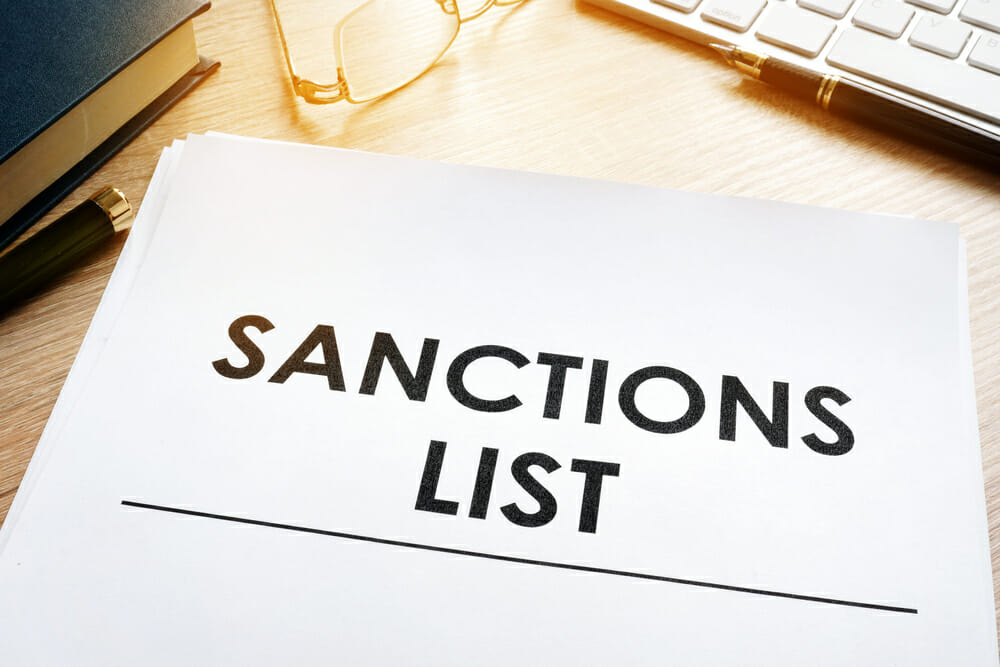Sanctions developments in 2023 and expectations for 2024

Risk of sanctions for businesses keeps rising
The Russian invasion of Ukraine in February 2022 sparked a sharp increase in international sanctions. The World Trade Organization projects that sanctions currently impact 12% of world trade. This trend persisted in 2023.1. In 2024, we anticipate additional sanctions proliferation due to the deteriorating geopolitical risk environment.
It’s crucial in this situation to know which sanctions might apply to your company. We provide a summary of the significant developments surrounding sanctions in 2023 in this insight, along with our forecasts for the upcoming year.
Key takeaways
- Australia and other significant countries kept stepping up their sanctions against Russia in 2023. This trend is probably going to continue in 2024, and in reaction to the Israel-Palestine conflict, Australia and other significant jurisdictions are probably going to impose new sanctions.
- The Australian Sanctions Office released new guidelines in 2023 that offer some general guidelines for what should be included in a framework for sanctions compliance. However, as companies attempt to negotiate intricate and conflicting sanctions regimes in 2024, more regulatory guidance will be required.
- Australia’s publicly reported enforcement activity was minimal in 2023; however, with increased cooperation between ASO and AUSTRAC, this could change in 2024.
Who should be aware of this in your organization?
In addition to making sure that sanctions programs are current, take into account ongoing changes to sanctions designations, and are appropriate for their intended use, senior management and the financial crime, legal, and compliance teams should stay up to date on developments in the sanctions landscape.
Teams responsible for frontline sanctions compliance (such as marketing, sales, and procurement, as well as freight and logistics) should also be informed about developments that impact them.
New sanctions restrictions
The implementation and enlargement of the price cap on Russian crude oil and petroleum, which was initially approved by the G7, the EU, and Australia in December 2022, was the most significant substantive development of 2023. The price cap aimed to lessen Russian revenue while preserving the stability of the world oil market. Sanctions designations for small- to medium-sized traders and shipping companies, the majority of which are based in Asia and the Middle East, have increased, nevertheless, due to worries about Russia evading the price cap. Other significant sanctions about Russia included Australia’s ban on all machinery exports to Russia, the EU’s provision of gas storage capacity to Russia, and bans on all exports of industrial goods and critical technology.
Outside of Russia, sanctions regimes already in place—such as the US, UK, and EU sanctions against Iran—saw extensions in 2023. Iran’s drone program is the focus of the tightened sanctions, which also limit the export of drone parts. The EU’s sanctions programs against Sudan, Niger, and Haiti, which aim to advance stability in those nations, are among the additional sanctions regimes that were extended throughout 2023.
New judicial guidance
The absence of legislative, regulatory, and judicial guidance regarding the interpretation and application of Australian and foreign sanctions laws has posed a significant challenge for companies seeking to comply with sanctions.
In 2023, there were instances where regulators and courts clarified important concepts related to sanctions laws. Most notably, the Office of Financial Sanctions Implementation (OFSI) intervened to clarify its approach to ownership and control in the recent UK cases of Mints v. PJSC National Bank Trust [2023] EWCA Civ 1132 and Litasco SA v. Der Mond Oil and Gas Africa SA [2023] EWHC 2866 (Comm) due to uncertainty regarding the interpretation of the sanctions ‘control’ test. These guidelines confirm that OFSI will evaluate each case individually and will not assume that a private company’s Russian incorporation or base indicates that it is under the control of a designated public official when determining whether an entity is owned or controlled by a designated person.
In Australia, the verdict in the Alumina and Bauxite Company Ltd. and Rusal Limited v. Queensland Alumina Ltd. (Rusal) Federal Court case is presently pending. The case will determine whether Rusal is affected by the sanctions imposed on two oligarchs with stakes in the company and the prohibition on selling aluminum ores and alumina to Russia. We anticipate that this ruling will give businesses crucial clarification on the degree of control necessary to increase the risk of sanctions for non-wholly owned businesses, as well as broad direction on how sanctions should be applied.
New regulatory guidance
The ASO’s recent publication of guidelines on sanctions evasion in the Australian export sector is a positive development for Australia. This is the ASO’s first time releasing such guidelines. Crucially, the suggestions are in line with worldwide guidelines released by the US Office of Foreign Assets Control (OFAC).
A high-level overview of the ASO’s requirements for sanctions compliance frameworks is contained in this guidance. This involves keeping efficient, risk-based compliance programs up to date and maintaining them. A successful compliance initiative will:
- Include senior management oversight,
- Risk assessment of the company and implementation of controls suited to the main sanctions risks the company faces, like customer due diligence.
- Be put to the test, audited, and include senior management and staff training.
Additionally, the guidelines outline typical indicators of sanctions evasion in the export industry that are generally applicable to all industries, including:
use of shell corporations and other legal structures to:
- Carry out international wire transfers, frequently involving financial institutions in jurisdictions different from company registration; or
- Conceal ownership, the source of funds, or the countries involved, especially sanctioned jurisdictions.
- Use of aliases, reluctance to share information, or use of personal email addresses (rather than company email addresses) in the context of business dealings are examples of complex and/or international businesses operating out of residential addresses or addresses shared by multiple closely held corporate entities.
- It would be great to see more industry guidance on important compliance topics from the ASO.
Looking abroad, in addition to the previously mentioned OFSI guidance, US and UK regulators have released additional regulatory guidance that businesses across a range of industries should be aware of. These include US and UK price cap guidance on petroleum products with a Russian origin and UK guidance on important indicators of Russian trade sanctions circumvention.
Publication of sanctions permits
The Department of Foreign Affairs and Trade has made public several general sanctions permits issued in 2022, which is another positive Australian development.
The ability to grant permissions for actions that would otherwise be punishable by law belongs to the Minister of Foreign Affairs. Subject to any specified conditions, “general permits” serve as a general authorization to all individuals who would otherwise be subject to Australian sanctions jurisdiction for the relevant activities.
The following topics are covered by the publicly available permits.
Challenges to sanctions listings
An increase in challenges to sanctions designations globally, including in Australia, has coincided with the ongoing spread of sanctions. Although there are still some unresolved issues, courts have so far shown little interest in intervening in sanctions determinations, which is indicative of the broad discretion that sanctions laws grant to governments.
Enforcement trends
Prosecutions with a high profile have happened, especially in the US:
- US$508 million settlement, the largest settlement to date with a non-financial institution, with British American Tobacco, a multinational tobacco company, for violations of North Korean sanctions in April 2023
- US$968 million settlement for over 1.6 million alleged violations of various sanctions regimes with Binance Holdings, a global cryptocurrency exchange company
- US$30 million settlement for alleged violations of sanctions against Iran, Syria, and Sudan with the multinational financial services firm Wells Fargo
In contrast, Australia has seen little action related to sanctions enforcement, even though individuals have occasionally been prosecuted for violating the sanctions. In 2023, there were no referrals or prosecutions under the Australian sanctions regimes; additionally, there have been no publicly disclosed corporate investigations or prosecutions in Australia to date, according to the Office of the Director of Public Prosecution’s 2023 Annual Report.
Our low enforcement activity may be partially explained by the Australian autonomous sanctions framework’s lack of a civil liability mechanism. Prosecutors’ only options for enforcement at this time are to file a criminal complaint or to take “no action.” We believe that a middle-ground civil option, akin to those implemented in the US and the UK, might be beneficial since it will give regulators flexibility to respond to violations resulting from system malfunctions and other comparable non-compliance situations in a more proportionate manner.
That being said, we anticipate that AUSTRAC and the ASO will work together more closely to issue notices now that AUSTRAC has established a specialized intelligence team to track and prioritize financial reporting regarding Russian sanctions. This partnership could lead to a rise in enforcement activity about sanctions.
Expectations for 2024
The ongoing review of the autonomous sanctions regime, which is anticipated to conclude soon, will play a pivotal role in determining the sanctions landscape for 2024. The potential introduction of civil penalties, which would enable the ASO to use non-criminal enforcement methods for less serious sanctions breaches, is one of the issues being reviewed. ASO enforcement activity would probably increase if this were put into practice. Furthermore, in April 2024, the Autonomous Sanctions Regulations are scheduled to come to an end. It is unclear if they will be remade with the same conditions or undergo changes in response to the findings of the independent sanctions review. The government will, nevertheless, have to deal with sanctions regulation in the first half of the year due to the planned sunsetting.
More generally, we anticipate that sanctions proliferation will continue in the short to medium term as long as the global conflict persists. For instance, in recent months, the US, the UK, and Australia have all imposed targeted financial sanctions on the Israel/Palestine conflict. As things progress, more sanctions are likely to be imposed. The US has imposed sanctions on money exchange services from Yemen and Turkey, which are believed to have assisted in providing funding to Houthi rebels who are launching attacks on commercial shipping vessels in the southern Red Sea. This conflict in the Red Sea has also started to spark sanctions activity. We believe more sanctions will be implemented, most likely aimed at the production of drones and their parts.
The Australian government’s first application of its significant cyber incidents sanctions regime to target financial sanctions against Russian national Aleksandr Ermakov, who was involved in the Medibank Private data breach, is a noteworthy development that took place in the first few days of 2024.
Lastly, as regulators cooperate more and share more intelligence, we anticipate that the risk associated with sanctions enforcement will begin to solidify in 2024. Collaboration between AUSTRAC and the ASO is anticipated to enhance the identification of possible sanctions violations on a domestic level. Globally, the establishment of task forces tasked with enforcing cross-border sanctions and Australia’s involvement in operations aimed at monitoring nuclear proliferation sanctions breaches in North Korea, like Operation Argos, could potentially exert more diplomatic pressure on the ASO to initiate enforcement measures.








